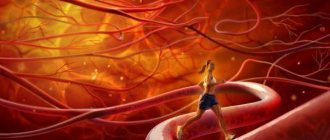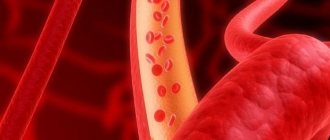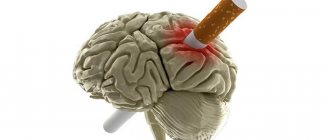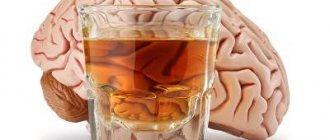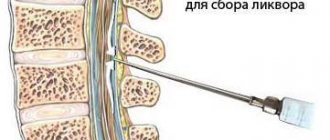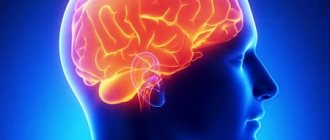[contents]
The functioning of the vascular system of the brain directly depends on the quality and intensity of its blood supply. With osteochondrosis of the neck, this process may be disrupted, which manifests itself in a large number of people suffering from this disease. One of the important conditions for restoring blood flow is the use of vasodilators .
Signs of circulatory disorders in the vessels of the brain with osteochondrosis
The symptoms of osteochondrosis are individual and depend on how affected the body systems are. Impaired blood circulation and reduced oxygen supply to the brain cannot remain without a trace and affect the well-being and general condition of the patient. The following manifestations are observed :
- Dizziness – often appears at the very beginning of the disease;
- Headache – reminiscent of a migraine, but does not go away after taking simple analgesics;
- Nausea - when bending over, turning the head, walking (sometimes vomiting);
- Decreased appetite is a consequence of nausea, possible weight loss;
- Pain in the neck or back of the head, radiating to the shoulders and arms, crunching when moving the head are common manifestations;
- Ringing and tinnitus are due to poor oxygen supply to the inner ear, where the vestibular apparatus is located. Hearing may be impaired;
- Deterioration of vision - more often appears with low blood pressure or atherosclerosis of the arteries of the brain;
- Emotional depression – irritability, sometimes insomnia, decreased performance;
- Jumps in blood pressure, difficulty swallowing, lack of air, loss of consciousness, increased temperature (usually in the neck) - these signs are less common, but are also observed when blood circulation is impaired.
At the slightest suspicion of osteochondrosis, you should immediately consult a specialist. Properly selected vasodilator drugs for the brain for osteochondrosis will help get rid of painful symptoms.
Contraindications to taking medications
Vascular medications for osteochondrosis normalize blood supply to the painful area and brain tissue. They must be prescribed to patients in the following cases:
- encephalopathy;
- vasospasm;
- cervicalgia;
- tendency to thrombosis;
- cervical radicular syndrome;
- increased blood viscosity.
Contraindications are:
- diabetes;
- severe arrhythmias;
- individual intolerance;
- coronary sclerosis;
- pregnancy and breastfeeding.
Drugs that improve cerebral circulation in cervical osteochondrosis are prescribed to patients not only to relieve the main symptoms, but also to eliminate possible causes of oxygen starvation of the brain. The patient is given a series of tests to make a diagnosis, but even before that, medications are taken to relieve headaches, tinnitus, and dizziness.
If a person loses the ability to remember information or perceives it worse, this is also an indication for taking vasodilator drugs. Another reason may be a lack of coordination that is not caused by any injuries to the spine or head.
Vasodilator drugs have some contraindications. It is strictly prohibited for people with low blood pressure to take drugs that improve cerebral circulation in case of cervical osteochondrosis. Vasodilation will lead to an even greater decrease in blood pressure.
Not all tablets are suitable
Also contraindications are:
- myocardial infarction less than a year ago;
- low level of platelets in the blood - poor blood clotting;
- allergies in aggravation;
- hemorrhagic stroke;
- intolerance to the components of the drug;
- kidney problems;
- acute arrhythmia;
- cardiac ischemia.
People with epilepsy, as well as those in a pre-infarction state, should not take medications of this effect.
Even with clear indications for taking drugs in this group, you should not self-medicate: this can significantly worsen the functioning of the cardiovascular system.
We suggest you read: Lumbar disc herniation symptoms and treatment
What happens in the blood vessels of the brain
The vertebral arteries play a major role in the cervical spinal column . It is through these vessels that blood is delivered to the cerebellum, occipital lobe and other posterior parts of the brain.
Each of the departments regulates certain functions of the body, such as the perception of taste, sounds, balance, etc. In addition, oxygen enters through blood vessels, which plays a huge and invaluable role in the functioning of departments and nerve cells.
With osteochondrosis, the arteries are not able to provide a complete supply of nutrients to the brain. There are several reasons for this :
- Compression, narrowing of blood vessels due to insufficient blood flow;
- Irritation of the nerve fibers (their endings) of the artery by bone growths on the vertebrae;
- Oxygen starvation.
In order to improve the functioning of important “transport pathways”, vasodilator drugs are prescribed.
Alpha blockers
These direct-acting medications affect both the central nervous system and the peripheral nervous system. Such remedies are indicated for people suffering from vascular diseases of the brain (cognitive disorders). They have a beneficial effect on the central nervous system, relieving tension and lowering blood pressure. The drugs have adrenergic blocking and vasodilating effects.
"Sermion" ("Nitsergoline")
The medication is available in tablet form. Its active substance is nicergoline. The drug helps improve blood supply to the brain. Experts prescribe it for chronic metabolic and vascular dysfunctions (for example, Raynaud's disease). In addition, Sermion is indicated for use in the treatment of thrombosis and arterial hypertension.
The recommended dose is 5-10 mg three times a day (2 times a day, 30 mg). A prerequisite is admission at regular intervals.
Among the side effects of the drug are:
- confusion;
- gagging;
- skin rashes;
- headache;
- decreased blood pressure;
- heat.
This medication should not be taken during pregnancy and lactation, by persons under 18 years of age, as well as by those who have suffered acute myocardial infarction or suffer from bleeding, bradycardia and sucrose deficiency.
"Phentolamine" ("Dibazin", "Regitin", "Rogitin")
Phentolamine is the active ingredient of a drug available in tablet form. This is a vasodilator that can relieve spasms and cure Raynaud's disease. Effectively used to eliminate atherosclerotic gangrene in the primary stages, frostbite and obliterating endarteritis.
Typically, the course of therapy lasts from 3 to 4 weeks. The recommended dose is 0.025 g for children and 0.05 g for adults 3-4 times a day.
Side effects of the medicine include:
- diarrhea;
- urge to vomit;
- headache;
- decreased blood pressure;
- stomach or duodenal ulcer.
Contraindications to taking Phentolamine are:
- hypotension;
- cardiac ischemia;
- myocardial infarction;
- angina pectoris;
- cardiogenic shock.
Individual intolerance to the active substance may occur.
Principles of vascular drug therapy
When treating osteochondrosis, to achieve a positive result, drugs are selected that dilate the blood vessels of the brain, and not other organs of the head . This choice is explained by the fact that some vasodilator drugs from the general list have the opposite effect, worsening blood supply.
The main task in treating the disease is to restore normal cerebral circulation, expand the lumen of blood vessels, and saturate brain tissue with oxygen . According to experts, all this can be achieved only with an integrated approach.
Drug effects on blood vessels are an irreplaceable and significant part of therapy, since drugs can quickly improve blood flow by thinning the blood, normalize metabolic processes, and also alleviate the patient’s condition.
Properly selected vasodilator drugs for the brain with osteochondrosis will help you get rid of excruciating pain
The course of medication must be combined with other treatment methods. These include general strengthening measures, physiotherapy, therapeutic exercises, and manual manipulation.
All prescriptions should be made exclusively after examination and taking into account the individual characteristics of each patient..
Despite the high efficiency and safety of modern drugs, doctors strictly monitor the dynamics of the process in order to change the dosage or the drug itself if necessary.
Xanthine derivatives
These drugs are able to neutralize adenosine receptors. In addition, when they are taken, the blood thins, vascular spasms go away, which helps to increase the elasticity and strength of the walls of tubular formations, and timely supply of oxygen and nutrients to the body tissues. Such medications are widely used in cases where it is necessary to improve memory, thinking processes, and eliminate chronic drowsiness and lethargy.
"Pentoxifylline SR Zentiva" ("Agapurin", "Vazonit", "Pentilin", "Radomin", "Trental 400")
The drug is available in the form of tablets and injection solution. Its active ingredient is pentoxifylline. The medication is so effective that it helps improve blood composition, normalize its circulation, and also provides the brain with all the necessary substances. In addition, after taking the drug, the walls of blood vessels expand, become elastic and relaxed. Thanks to the drug, the risk of developing hypoxia is reduced.
The recommended dose is 200 mg three times a day. The course of treatment is prescribed by the doctor individually, depending on the patient’s age, general health condition and other characteristics.
The drug should not be taken in the following cases:
- age under 18 years;
- pregnancy and lactation;
- hemorrhages in the retina of the eye;
- heart rhythm disturbance;
- atherosclerosis (coronary or cerebral);
- acute myocardial infarction;
- various bleedings;
- hemorrhagic stroke.
Side effects of the drug include gastrointestinal disorders (diarrhea, intestinal and stomach cramps, vomiting). Quite rarely, a feeling of flushing, a decrease in blood pressure, and cardiac dysfunction are observed (Vedrin, Complamin, Xavin, Xanthinol nicotinate, Megemin, Sadamin).
The drug is available in the form of solution and tablets. Its active ingredient is xanthinol nicotinate. This medication eliminates the effects of cerebral hypoxia, improves cerebral circulation, and also increases myocardial contractility. While taking the medicine, the amount of cholesterol and atherogenic lipoproteins decreases, the blood composition improves, the biological fluid becomes less viscous (platelet aggregation decreases). With prolonged use of the product, oxygenation and tissue nutrition are normalized.
The drug is contraindicated in the following cases:
- pregnancy;
- breastfeeding period;
- ulcers of the stomach and duodenum;
- acute liver and kidney failure;
- hypersensitivity to the active substance;
- heavy bleeding.
Among the side effects of the drug are the following:
- diarrhea;
- urge to vomit;
- lethargy;
- lack of appetite;
- dizziness;
- low pressure.
The initial dose is 150 mg three times a day. The drug is taken orally after eating. The doctor may increase the amount of medication to 600 mg in 3 doses.
"Eufillin"
The drug is available in the form of tablets and solution. Aminophylline is its active ingredient. The drug is taken orally after eating food, 1 to 3 times a day, 150 mg (dosage prescribed by a doctor).
Side effects may include:
- urge to vomit;
- headache;
- sleep disorders;
- rash;
- increased nervousness;
- tachycardia;
- ari class=”aligncenter” width=”600″ height=”271″[/img]
The drug helps to dilate blood vessels and normalize blood flow. Suitable for the treatment of respiratory diseases, as well as peripheral circulatory disorders.
Vasodilators for the brain with osteochondrosis
Treatment of cervical osteochondrosis is specific and is aimed primarily at improving the functioning of the blood vessels of the head. Accordingly, special drugs are used that are different from those used in the treatment of pathological processes in other parts of the spine.
vasodilators for the brain are prescribed :
Nootropic drugs – activate metabolism in brain tissue and higher mental functions (learning ability, memory, etc.). These include:
- Piracetam - reduces vascular spasm, thereby positively affecting cerebral circulation, and also reduces the viscosity of plasma and whole blood. The peculiarity of this drug is that the desired effect is achieved only with long-term use of sufficiently large doses;
- Picamilon - increases blood flow speed and microcirculation, reduces vascular resistance, restores performance (both physical and mental);
- Cinnarizine (Stugeron) - dilates the blood vessels of the brain by reducing the tone of smooth muscles, reduces blood viscosity. More often used as a component of combination drugs together with Piracetam;
Vasodilators are vasodilators that normalize venous outflow and help restore sympathetic nerve fibers. There are two types of such drugs: myotropic (affect vascular walls) and neurotropic (on vascular tone, its nervous regulation). This group includes:
- Vinpocetine (Cavinton) – stimulates blood flow in the head, dilates blood vessels, eliminates disruptions in metabolic processes and blood circulation, relieves the brain from oxygen starvation;
- Xanthinol nicotinate – has vasodilating properties, increases blood circulation in the brain, improves metabolism;
- Eufillin - dilates the bronchi, removes muscle spasms, thereby improving peripheral and cerebral circulation. Typically used in electrophoresis;
- Berlition (Lipoic acid) – increases the lumen of blood vessels, tidies up the neurovascular system of the body and improves the nutrition of nerve cells;
- Trental (Pentoxifylline) – improves blood viscosity, fluidity, microcirculation throughout the body. A strong remedy that must be taken with caution and in limited quantities;
Antithrombotic drugs are drugs that prevent the formation of blood clots and have a positive effect on blood circulation. They are combined into two large groups:
- Anticoagulants - slow down blood clotting by breaking fibrin strands. This leads to the resorption of existing blood clots and an increase in the lumen of blood vessels. Heparin, Warfarin, Phenilin, Fibrinolysin, etc. are prescribed;
- Antiplatelet agents - prevent the adhesion of red blood cells and platelets, thereby dilating blood vessels. These include Aspirin, Ticlopidine, Trental, Curantil, etc.;
When treating osteochondrosis, special gels and ointments are used for external use . To reduce general symptoms, analgesic, homeopathic, anti-inflammatory, chondroprotective, complex action and massage agents are used.
To improve blood flow, special ointments have been developed that have an irritating, analgesic and vasodilating effect. These include Finalgon, Capsicam, Nicoflex, Abiflor, Menovazan, etc. They normalize metabolism and improve blood circulation. Also prescribed by a doctor;
During treatment, patients are strongly recommended to take vitamins and vitamin complexes to compensate for the lack of essential elements, minerals, strengthen the walls of blood vessels and support the entire body:
- Vitamins P and C (Ascorutin, dietary supplement Blueberry Forte);
- Selenium, silicon, potassium - these minerals in vitamin complexes significantly increase their effectiveness in relation to blood vessels;
- Dihydroquercetin is an antioxidant of natural origin (from the bark of the Siberian larch). Maintains blood viscosity and improves blood circulation.
In addition, each of them has contraindications, which must be determined by the doctor after a detailed examination of each individual patient.
Calcium antagonists
These drugs are aimed at rapidly expanding the walls of tubular formations, which helps normalize blood supply to the brain. This occurs by blocking the supply of calcium from the blood to the body's cells.
There are the following two categories of drugs: first-generation calcium antagonists (have a short-term effect) and second-generation (characterized by long-term effects).
"Adalat SL" ("Cordipin HL", "Nifedipine", "Nifecard HL", "Phenigidin")
"Adalat SL" ("Nifedipine", "Phenigidin", "Cordipine HL", "Nifecard HL") is a calcium antagonist, available in the form of tablets and solution. Nifedipine is the active ingredient of the drug. It is effectively used for angina pectoris, chronic ischemia, and arterial hypertension.
The drug is intended for patients over 18 years of age. The recommended dose is one tablet twice a day. The doctor may increase the amount taken to 60 mg. The interval between doses of the medication should be 6-12 hours.
It is important to observe gradual withdrawal of the drug.
The following side effects may occur when using Adalat SL:
- pain in the abdominal area;
- constipation;
- gagging;
- visual impairment;
- drowsiness;
- swelling of the legs;
- myalgia;
- hives;
- lethargy and malaise;
- dizziness and cephalgia.
The medicine must not be taken in the following cases:
- pregnancy;
- lactation period;
- hypersensitivity to nifedipine;
- simultaneously with taking Rifampicin;
- cardiovascular shock.
"Amlodipine" ("Norvasc", "Vero-Amlodipine")
The medicine is available in tablet form. Its active ingredient is amlodipine besylate. The medication has a long-lasting effect. The drug dilates the coronary and peripheral arteries, arterioles, due to which people suffering from angina pectoris get rid of a high degree of myocardial ischemia. In case of coronary artery disease, the drug has cardioprotective and antiatherosclerotic effects.
The medication is used once a day, 5 mg, regardless of meals. Your doctor may increase your dose to a maximum of 10 mg per day.
Side effects of Amlodipine include:
- hypotension;
- urge to vomit, nausea;
- decreased potency;
- pain when urinating;
- dry mouth;
- myalgia;
- cramps and arthrosis.
The medication is not prescribed in the following cases:
- lactation and pregnancy;
- individual intolerance to the active substance;
- acute form of arterial hypotension.
The drug is recommended for use by patients over 18 years of age.
"Verapamil" ("Finoptin", "Isoptin")
The active ingredient of the drug, available in the form of solution and tablets, is verapamil hydrochloride. The first generation medicine has the following positive characteristics:
- reduces the heart's need for oxygen by reducing afterload;
- has antianginal and antiarrhythmic effects;
- improves blood circulation;
- lowers blood pressure.
The tablets can be taken regardless of food intake. The recommended dose is 80 mg three times a day.
After seven days after the first dose of the medicine, the doctor may increase the amount of the drug.
Among the side effects of Verapamil, the following are noted:
- decreased blood pressure;
- allergic skin rashes;
- heart rhythm failure;
- dry mouth;
- hearing and vision impairment;
- bleeding gums;
- myocardial infarction.
Causes of cervical osteochondrosis
Pathological processes in the cervical spine rank second in prevalence among all types of osteochondrosis. More often, people over 50 years of age go to the doctor, but the first signs may appear much earlier.
The causes of the disease are not related only to age, since some people do not develop skeletal problems throughout their lives. Experts identify the following factors that provoke the development of neck osteochondrosis :
- Excess weight;
- Great physical activity;
- Hypothermia;
- Sedentary, sedentary lifestyle;
- Impaired metabolism in the body;
- Hormonal disorders;
- Hereditary predisposition;
- Nervous tension, stress;
- Previously received injuries to the neck, neck, back;
- Congenital pathologies of the spine structure, acquired postural disorders;
- Lupus erythematosus, rheumatism.

